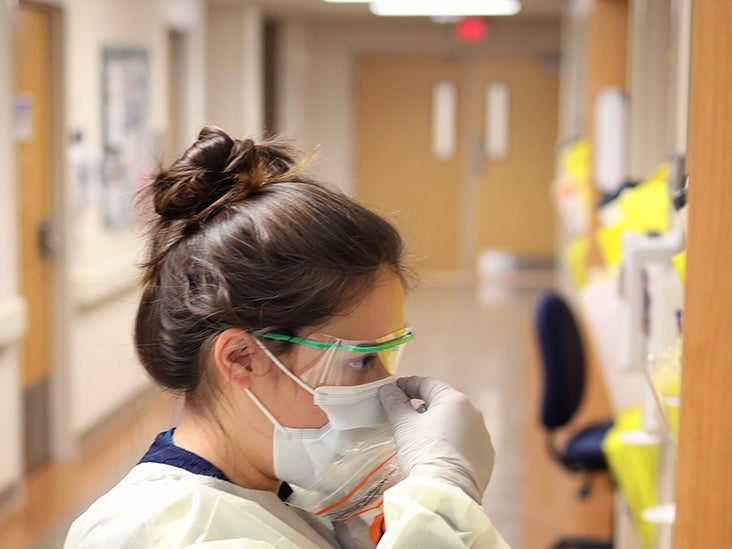
A study of severe COVID-19 in the United Kingdom reveals the risk that healthcare workers take to help others.
A new study in the journal Occupational & Environmental Medicine examines the risks that “essential” and “nonessential” British workers will develop severe COVID-19.
It suggests that healthcare workers are seven times more likely to develop severe cases of COVID-19 than people with “nonessential” roles.
Although it makes sense that people who interact with COVID-19 patients are at greater risk, this is the first study to compare their risk of developing severe disease with that of other types of workers.
As the study authors conclude:
“Our findings reinforce the need for adequate health and safety arrangements and provision of [personal protective equipment] for essential workers, especially in the health and social care sectors. The health and well-being of essential workers is critical to limiting the spread and managing the burden of global pandemics.”
The researchers analyzed three sources of data:
- Public Health England COVID-19 test results
- recorded deaths from March 16, 2020 to July 26, 2020
- UK Biobank study data covering the years 2006–2010
The UK Biobank data allowed the researchers to track multiple factors that may be associated with the development of severe disease beyond one’s occupation.
A total of 120,075 employees, aged 49–64 years, were involved in the study. Black and Asian people, who are more likely to be essential workers, comprised nearly 3% of the group.
Around 32,127 employees, or 29% of the participants, were essential workers.
- Healthcare workers made up 9% of the total cohort.
- Social care and education workers made up 11% of the total cohort.
- Those with “other” jobs, including police and people in food preparation, made up 9% of the total cohort.
The team broke the “healthcare workers” category down further into:
- doctors and pharmacists, or “healthcare professionals”
- medical support staff
- nurses and paramedics, or “health associate professionals”
- social care and transport workers
For the purposes of the study, the researchers considered anyone with a hospital diagnosis of COVID-19 and anyone who died of the disease to have a severe case.
Of the total study group, 271 employees had severe COVID-19.
The healthcare workers category overall experienced an average of seven times as many severe cases as nonessential workers.
The study suggests that medical support staff are the most vulnerable. They were nine times more likely to develop severe disease than people in nonessential occupations.
People in the social care and education category had an 84% higher risk, while those providing social care were 2.5 times more likely to have a severe case of the disease.
Transport workers were twice as likely to get seriously ill as nonessential workers, and the risks for people in the “other” category, in general, were 60% higher.
The researchers’ analysis revealed a racial disparity in the likelihood of having a severe case of the disease. This parallels the racial imbalance in deaths from COVID-19.
Black and Asian essential workers were eight times as likely to have severe cases as white nonessential workers.
Black and Asian nonessential employees were three times more likely to have severe cases than their white counterparts.
In addition, their severe case rates were roughly equivalent to those that white essential workers experienced.
The researchers point out several limitations of their study. These include the following:
- The study did not delve into how workers contracted SARS-CoV-2, which is the virus that causes COVID-19. It reports only how many people had severe cases of the disease.
- The UK Biobank data do not represent the broader U.K. population, being limited to people aged 49–64 years. They also comprise health records that are, at best, 10 years old. Therefore, these records cannot reflect changing lifestyle factors since 2010 that might have affected infection rates.
- The data from March 2020 to July 2020 do not explore the influence of the availability or nonavailability of personal protective equipment for healthcare employees.
However, the study authors do point out that despite these issues, their conclusions are consistent with the findings of other COVID-19 research.
For live updates on the latest developments regarding the novel coronavirus and COVID-19, click here.
"severe" - Google News
December 28, 2020 at 06:26PM
https://ift.tt/3rvzjoS
Healthcare workers have 7 times the risk of severe COVID-19 - Medical News Today
"severe" - Google News
https://ift.tt/2OrY17E
Shoes Man Tutorial
Pos News Update
Meme Update
Korean Entertainment News
Japan News Update
Bagikan Berita Ini















0 Response to "Healthcare workers have 7 times the risk of severe COVID-19 - Medical News Today"
Post a Comment